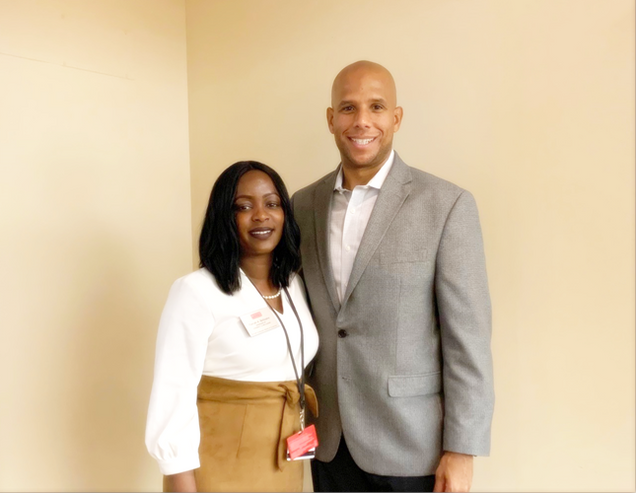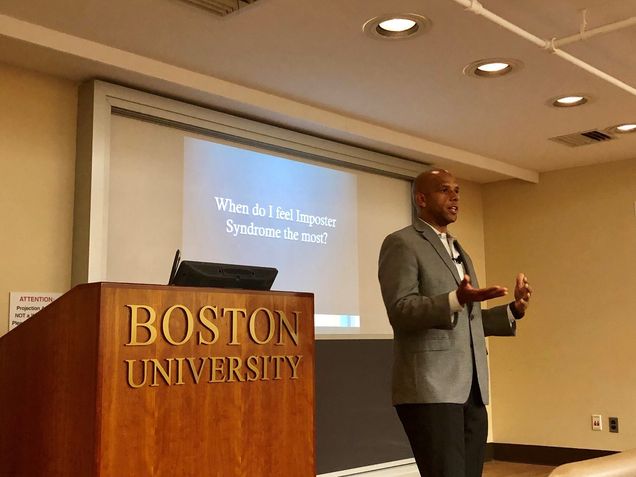Overcoming Stereotypes & Imposter Syndrome
 GMS Diversity & Inclusion Associate Director Farrah Belizaire with Alden Landry from Harvard Medical School.
GMS Diversity & Inclusion Associate Director Farrah Belizaire with Alden Landry from Harvard Medical School.
.
“Imposter Syndrome” is the feeling that you’ve only succeeded by luck or faking it, rather than by talent or qualifications. It can take various forms depending on someone’s background, personality and circumstances.
BUSM welcomed Alden M. Landry, MD, MPH, to campus on Nov. 19 for an interactive and informative session on the complexities of imposter syndrome and its potential impact on career growth and personal well-being.
Dr. Landry, Assistant Director of the Office of Diversity, Inclusion and Community Partnership at Harvard Medical School, humbly introduced himself as an imposter, and confessed how he feels when he hears his introduction: “When I hear my bio, I think, ‘that can’t be me.’ Who are they talking about? Who could do all that?”
The conversation started off quietly.
“I’m not looking for the Merriam Webster definition or a Google scholar search, I want to hear what you all thought about when you decided to come to this presentation,” Dr. Landry asked the group. Hands rose and students, faculty and staff began to open up about how they interpret its meaning.
“The working definition of imposter syndrome is feeling like a fake or a fraud in a position, and feeling as if at some point that you will be found out and then this house of cards will come crumbling down,” said Dr. Landry. He explained that the term came about in the 1970s (during the feminist movement) around successful women in business and eventually made its way to other marginalized groups.

Through an honest, back-and-forth conversation, Dr. Landry helped participants understand:
When people might feel this way
- In times of transition (undergrad to graduate, junior faculty to mid-career faculty, etc.)
- When people’s knowledge is questioned
- When people are awarded or recognized
- When opportunities for advancement arise, such as during interviews or applications
What it may impact
- People can become more hesitant or regretful
- People can experience self-doubt and exclude themselves from potential opportunities
- Can lead to complacency, procrastination and underachievement
- Can lead to increased pressure to exceed expectations, burnout, anxiety and depression
How to overcome it
- Admit you played a role in your own success
- Emphasize the importance of your own self-worth
- Don’t compare yourself to others
- Know your limitations
- Affirm your accomplishments by documenting your successes
- Surround yourself with mentors (peers, professional, academic advisors, etc.)
“I’m not presenting groundbreaking research that is going to change the way we provide care for patients, but it takes a certain level of confidence to stand up in front of your colleagues and share these experiences,” said Dr. Landry.
This event was sponsored by Graduate Medical Sciences Initiative for Diversity, Equity & Inclusion; the BUSM Diversity & Inclusion Office; and the Henry M. Goldman School of Dental Medicine Diversity & Inclusion Office.
View all posts